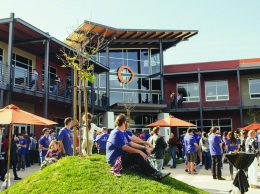Dubroff: Tri-Counties becoming hot spot for new capital investments

Henry Dubroff
Capital markets have discovered the Tri-Counties in a big way in 2017.
This might be a permanent change in the way wealth is created and distributed in the region or a warning sign that markets are close to a peak.
On May 23, The Trade Desk, the region’s only IPO of 2016, announced that existing shareholders will sell another $200 million in stock, a move that came on the wake of a strong quarterly earnings report. The Trade Desk’s cloud-based advertising platform is a hit with large advertising agencies and their clients.
Meanwhile, MindBody, the fitness and health software company based in San Luis Obispo, is raising an additional $120 million in the public markets as it puts up impressive revenue gains and inches toward profitability.
Finally, there is Dole Food, which has a $100 million IPO headed to market later this year. A successful stock offering from the Westlake Village-based company would turn one of the region’s largest private companies into a top five publicly traded company, quite a coup for Dole’s 94-year-old chairman David Murdock.
For some perspective on what this busy week for regional businesses really means, I turned to some of the region’s experts on markets and technology.
For Electronic Arts founder and former CEO Trip Hawkins, it’s a validation of his move to the Central Coast a couple of years ago. “It’s great to see both investor commitments and liquidity for stakeholders, as they are healthy economic signals for our region that will invite more of both,” he said.
Highmark Capital Chief Investment Officer Todd Lowenstein said he sees elements of the Trump bump in the activity. “Heightened animal spirits post-election means corporate mindsets have shifted; capital markets and the economy will benefit after a hibernation period,” he wrote in an email.
But for both of them there are some caveats. For Hawkins, the economy’s long slow grind means a different pace to growth. “Frankly, the economy of my youth now seems like Camelot,” he wrote in an email. “Today we’re making gradual gains every year that may finally put 2008 out of our rear view mirrors.”
Lowenstein said the market’s recent rise has created the right conditions for activity.
“Markets sitting at record levels and full valuations incentivizes companies to monetize assets and trigger liquidity events,” he said.
For technology companies, Lowenstein said, investment banks and venture capitalists have grown more comfortable with the idea of the Central Coast as a place with quality deals. But he said the fact that a rising tide lifts all boats is inescapable. Dole, MindBody and The Trade Desk’s shareholders are going to “raise capital under highly favorable conditions,” he added.
For The Trade Desk shareholders, that’s quite an understatement. The company went public at $18 and shot up to $28 on its first day. On May 23 it closed at $53.48, nearly double its first day closing price.
MindBody shares traded at around $13.50 just a year ago and closed at $27.85 on May 23, with a high of nearly $30 per share in the past year.
Dole Food’s IPO has not yet been scheduled and it did lose money last year. But many experts think the company has figured out that it is in the business of producing food, not simply growing fruits and vegetables. That means higher margins and better pricing power if it can execute effectively.
Finally, a cautionary note. In the late 1990s, the region counted four companies in the S&P 500 index and others with multi-billion dollar market capitalizations. Several of them, notably Vitesse Semiconductor and Software.com, went into a free fall and no longer exist.
Today’s valuations aren’t as extreme. But cycles do have a way of repeating.
NEW FRONTIER FOR FRONTIER
Meanwhile, Frontier Communication, a company that took the region by storm just a few years ago, has had a narrow escape from de-listing. Frontier’s much-publicized takeover of Verizon’s land line operations in California and elsewhere has been plagued by customer service problems, accounting woes and credit rating downgrades.
The stock has been punished, hitting a 34-year low in early May at $1.40. In July, the company will execute a one for 15 reverse stock split, hopefully taking the stock back to the $20 to $25 range.
• Reach Editor Henry Dubroff at [email protected].












